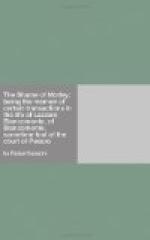Ramiro looked at him with eyes rendered dull by agony. He moistened his lips with his tongue, and turning his head towards his men—
“Wine,” he gasped, from very force of habit. “A cup of wine!”
“Let it be supplied him,” said Cesare coldly, and we all stood waiting while a servant filled him a cup. Ramiro gulped the wine avidly, never pausing until the goblet was empty.
“Now,” said Cesare, who had been watching him, “will it please you to answer my question?”
“My lord,” said Ramiro, revived and strengthened in spirit by the draught, “I must ask your Excellency to be a little plainer with me. To what conspiracy is it that you refer? I know of none. What is this letter which you say Vitelli wrote me? I take it you refer to the Lord of Citta di Castello. But I can recall no letters passing between us. My acquaintance with him is of the slightest.”
Cesare looked at him a second.
“Approach,” he curtly bade him, and Ramiro came forward, one of the Borgia halberdiers on either side of him, each holding him by an arm. The Duke thrust the letter under his eyes. “Have you never seen that before?”
Ramiro looked at it a moment, and his attempt at dissembling bewilderment was a ludicrous thing to witness.
“Never,” he said brazenly at last.
Cesare folded the letter and slipped it into the breast of his doublet. From his girdle he took a second paper. He turned from Ramiro.
“Don Miguel,” he called.
From behind his men-at-arms a tall man, all dressed in black, stood forward. It was Cesare’s Spanish captain, one whose name was as well known and as well-dreaded in Italy as Cesare’s own. The Duke held out to him the paper that he had produced.
“You heard the question that I asked Messer del’ Orca?” he inquired.
“I heard, Illustrious” answered Miguel, with a bow.
“See that you obtain me an answer to it, as well as an account of the other matters that I have noted on this list—concerning the misappropriation of stores, the retention of taxes illicitly levied, and the wanton cruelty towards my good citizens of Cesena. Put him to the question without delay, and record me his replies. The implements are yonder.”
And with the same calm indifference which characterised his every word and action Cesare pointed to the torture, and turned to Madonna Paola, as though he gave the matter of Ramiro del’ Orca and his misdeeds not another thought.
“Mercy, my lord,” rang now the voice of Ramiro, laden with horrid fear. “I will speak.”
“Then do so—to Don Miguel. He will question you in my name.” Again he turned to Madonna. “Madonna Paola, may I conduct you hence? Things may perhaps occur which it is not seemly your gentle eyes should witness. Messer Biancomonte, attend us.”
Now, in spite of all that Ramiro had made me suffer, I should have been loath to have remained and witnessed his examination. That they would torture him was now inevitable. His chance of answering freely was gone. Even if he returned meek replies to Don Miguel’s questions, that gentleman would, no doubt, still submit him to the cord by way of assuring himself that such replies were true ones.




